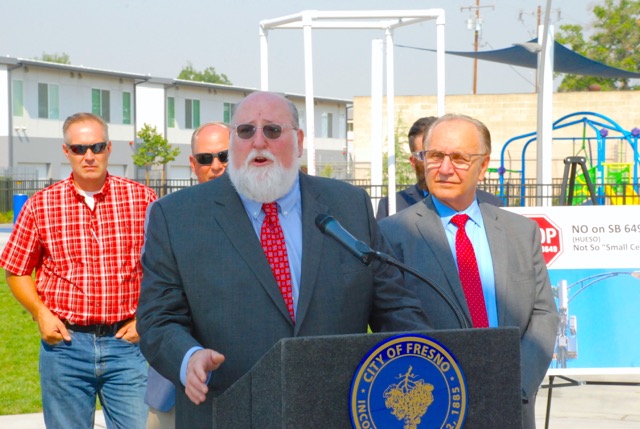
Jonathan L. Kramer, a Los Angeles lawyer specializing in telecommunications law, joined Fresno Mayor Lee Brand in opposing California Senate Bill 649. Photo by David Castellon
Written by
Fresno Mayor Lee Brand announced today that the city is opposing legislation that would allow companies greater freedom in where they install mini cellular antennas by curtailing the powers counties and cities have in the process.
“We’re here today to talk about [California] Senate Bill 649. The City of Fresno opposes SB 649, and over 215 cities and dozens of counties across the state of California oppose it,” Brand told reporters at a press conference at Cultural Arts District Park in Downtown Fresno.
He called the legislation an “end around” trying to bypass dozens of local agreements between wireless companies and local governments that also removes rules requiring the companies to upgrade their services in rural and disadvantaged communities.
“Stripping away these requirements could make it disastrous for businesses and residents in disadvantaged areas who could see their cell service stagnate while upgrades happen only in prosperous areas,” said the mayor, who accused the telecommunication providers of not caring about small markets.
In addition, he said if the bill becomes law, it would take away local control Fresno and other municipalities have in determining where “small cells” can go, as the telecommunication companies would have the ability to mount them on publicly-owned properties — including light poles, utility poles and on the ground.
The legislation stems from a movement in the telecommunications industry to boost signal and bandwidth with for cell phones, computers and other items by installing “small cell” antennas around communities to boost signal strength rather than building large, “macro” towers.
But while some of these “small” antennas look to be about the size of a filled backpack, some are the size of refrigerators.
“Would you want one of those in front of you house,” or possibly four, as all four of the cellular providers — Sprint, AT&T, Verizon and T-Mobile — would install their own equipment, asked Jonathan L. Kramer, a telecommunications engineer and lawyers whose firm specializes in represents in representing local governments on telecommunications issues, including Fresno.
“This bill would essentially strip local governments of the authority to find the best locations for these boxes and in many cases how the boxes are designed or installed,” he said.
“This is equipment that is going to be in the public right of way for at least 40 years, so doing it right the first time is critically important, and under SB 649 we are taken out of that process.
“It’s just up to the wireless companies to suit their needs, not the public’s needs,” said Kramer, who claimed that the industry wrote the bill sponsored by state Sen. Ben Hueso, D-Chula Vista.
Erin Hickey, a spokeswoman for Hueso, denied that claim. And while the senator was unavailable for comment, she did provide a fact sheet on the bill that states “In many localities, the rules, regulations and application fees for wireless infrastructure are decades old, put in place when 200-foot-tall cell towers were the norm. These rules are barriers to meeting today’s wireless demand and enabling small cell 5G innovations.”
The bill also includes a laundry list of requirements for cities and counties including:
• That they make their vertical infrastructure — light and utility poles — available for the placement of small cells under fair and reasonable fees, terms, and conditions.
• Establishes that small cells are permitted uses not subject to city or county discretionary permits in rights-of-way and commercial and industrial zones.
• Annual charges by cities or counties can’t exceed $250 for each small cell attached to vertical infrastructure, with some additional fees.
But Hanford City Manager Darrel Pyle, one of 14 representatives from other Valley cities that stood behind Brand during the press conference, told reporters that cites could negotiate lease fees with wireless companies much higher that the bill’s $250 cap.
And cities like his can require that the equipment be hidden — sometimes inside phony trees or placed out of sight in boxes with aesthetically-pleasing designs, rather than having a bunch of equipment and cables that looks like “the inside of a refrigerator hung off a power pole. That’s not what the community is interested in seeing.”
And Kramer noted that money from the lease agreements with the wireless providers usually goes into general funds and other accounts to help cities pay for services.
“Typically, all of our leases are on towers … in the $2,500 a month range,” said Pyle, adding that small cell antennas haven’t been installed yet in in his city, so lease rates for them haven’t been negotiated.
In May, the City of Fresno contracted with Irvine-based 5 Bars to work with the wireless companies to arrange the installation of small cells in Fresno, which includes working on the city’s behalf to find locations for the new equipment and negotiating lease rates.
Monnie McGaffigan, president of 5 Bars, said in an interview earlier this year — before SB 649 was presented to the Senate — that lease fees paid by the carriers could earn Fresno more than $2.6 million over the first five years.







